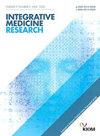草药(Thatbunjob)治疗食源性疾病的疗效:一项安慰剂对照的随机试验
IF 3
4区 医学
Q2 INTEGRATIVE & COMPLEMENTARY MEDICINE
引用次数: 0
摘要
食源性疾病(FI)每年造成6亿例病例和42万人死亡。目前的治疗重点是补液和抗痉挛药物治疗脱水和腹痛(AP)。然而,需要替代疗法,特别是那些从天然成分中提取的疗法。本研究探讨了草药Thatbunjob作为FI相关AP的补充疗法的潜在疗效。方法采用双盲、随机、安慰剂对照临床试验评估Thatbunjob缓解FI患者AP的疗效。114例患者,年龄18-60岁,伴有AP和腹泻(24小时内≥3次发作),每日3次,服用两次500 mg Thatbunjob胶囊或安慰剂,连续3天。两组患者均接受标准的口服补液治疗。主要结果包括24 h时视觉模拟量表(VAS)的AP强度,次要结果包括48和72 h时的疼痛、反应率、丁基溴的使用、大便频率和不良事件。结果与安慰剂组相比,Thatbunjob组的AP明显减少。24 h时VAS评分由5.69降至2.95 (P <;0.001),疼痛缓解持续为48 (1.43 vs. 3.05, P <;0.001)和72 h (0.32 vs. 1.86, P <;0.001)。与安慰剂相比,这项研究还减少了对海莨菪碱片的需求,并减少了大便频率。结论本研究表明,bunjob联合标准补液治疗可有效缓解FI患者的AP并减少大便频率。试验注册泰国临床试验注册中心,TCTR20220823001。本文章由计算机程序翻译,如有差异,请以英文原文为准。
Efficacy of herbal medicine (Thatbunjob) in the treatment of foodborne illness: A placebo-controlled, randomized trial
Background
Foodborne illness (FI) causes 600 million cases and 420,000 deaths annually. Current treatments focus on rehydration and antispasmodic medications for managing dehydration and abdominal pain (AP). However, alternative therapies, especially those derived from natural ingredients, are needed. This study investigates the potential efficacy of herbal medicine,Thatbunjob as a complementary therapy for FI-related AP.
Methods
A double-blind, randomized, placebo-controlled clinical trial assessed the efficacy of Thatbunjob in relieving AP in FI patients. A total of 114 patients, aged 18–60, with AP and diarrhea (≥3 episodes in 24 h), received either two 500 mg capsules of Thatbunjob or a placebo three times daily for three days. Both groups also received standard oral rehydration therapy. Primary outcomes included AP intensity using a visual analog scale (VAS) at 24 h, while secondary outcomes included pain at 48 and 72 h, responder rates, hyoscine butyl bromide usage, stool frequency, and adverse events.
Results
The Thatbunjob group showed significantly greater reduction in AP compared to the placebo. VAS scores decreased from 5.69 to 2.95 at 24 h (P < 0.001), and pain relief persisted at 48 (1.43 vs. 3.05, P < 0.001) and 72 h (0.32 vs. 1.86, P < 0.001). Thatbunjob also reduced the need for hyoscine tablets and decreased stool frequency compared to placebo.
Conclusion
This study demonstrates that Thatbunjob, when combined with standard rehydration therapy, effectively alleviates AP and reduces stool frequency in FI patients.
Trial registration
Thai Clinical Trials Registry, TCTR20220823001.
求助全文
通过发布文献求助,成功后即可免费获取论文全文。
去求助
来源期刊

Integrative Medicine Research
Medicine-Complementary and Alternative Medicine
CiteScore
6.50
自引率
2.90%
发文量
65
审稿时长
12 weeks
期刊介绍:
Integrative Medicine Research (IMR) is a quarterly, peer-reviewed journal focused on scientific research for integrative medicine including traditional medicine (emphasis on acupuncture and herbal medicine), complementary and alternative medicine, and systems medicine. The journal includes papers on basic research, clinical research, methodology, theory, computational analysis and modelling, topical reviews, medical history, education and policy based on physiology, pathology, diagnosis and the systems approach in the field of integrative medicine.
 求助内容:
求助内容: 应助结果提醒方式:
应助结果提醒方式:


